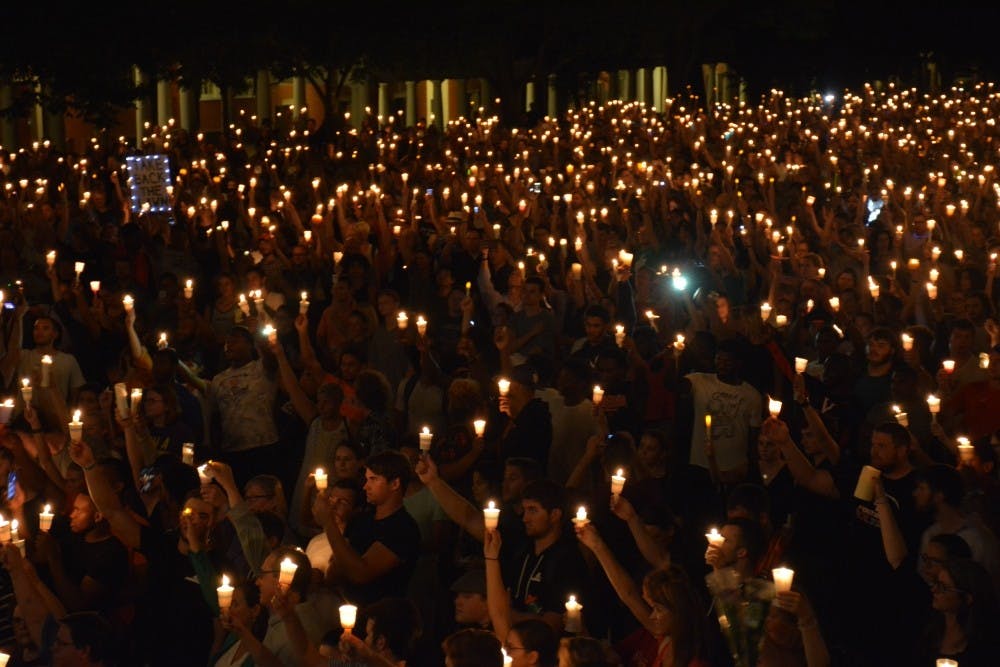On Friday, Aug. 18, Prof. Shaun R. Harper — University of Southern California, Rossier School of Education — charged the 200 or so faculty and staff sitting in McLeod Hall to commit to never graduating a white supremacist from this University.
Having spoken with him after, I realized he was unaware both Richard Spencer and Jason Kessler are alumni of the University and the result of deep institutional failure. And although Harper gave this task to us without that knowledge, the message he delivered was clear and still resonated throughout the room.
It resonated so strongly because everyone understood how hard a challenge like that is to execute, since insidious forms of hate can lie dormant for years. But it certainly isn’t impossible. I believe there are two incredibly important — but often overlooked — things which administrators, faculty and students need to address to be able to move towards that ideal. If we get there, we may also begin to create an institution that is fully affirming of all differences — one that recognizes that excellence is achieved through diversity.
The first is that we are an institution built upon a difficult legacy of white supremacy, and advanced by an idyllic portrayal of our history. The second is that we have an institutional responsibility to intentionally guide students away from ignorance and hate.
The false narrative of the University goes like this: Thomas Jefferson envisioned an ideal community when he founded the University. He constructed our hallowed grounds and embodied the vision of an academical village. In doing so, he formed a place where an openly gay student from London like myself could be happy for four years — and even return to work at the University after graduation.
Some of that is true. I was exceptionally happy here, and acknowledge the extraordinary insight of Jefferson to develop an academic community. But last week, when that grey Dodge Challenger struck a crowd of counter-protesters down 4th street and missed me by inches, I was not standing there on behalf of a utopian vision of the University. I was standing on that street on behalf of the people who labored and died so that I might be there — for Skipwith, for Gibbons and for the other slaves who toiled and are buried on Grounds. I was there representing the spirits and souls of people who couldn’t be there themselves.
That truth may be less appealing than the false promise of paradise, but it is a far more important insight into our institution. If we can collectively agree to advance that forward — and in doing so participate in conscious and deliberate dialogue and actively engage with others to overcome segregation — we will begin to affect everyone around us.
Although it seems obvious, it must be explicitly stated that every student of this University should have an intentional conversation about race, anti-Semitism, homophobia, xenophobia and hate by the time they graduate. Whether this is achieved through curricular reform at the highest level, or by individual departments and offices, every professor and administrator here is fully able to make that happen.
I feel compelled to make this statement because the most tragic moments I experienced last weekend were the ones where I witnessed the youngest white supremacists out on the streets. They chanted, just like the others, “Blood and Soil,” “White Lives Matter” and “You Will Not Replace Us.” They had the same hate in their eyes as everyone else around them. But if you looked at them a little longer you could make out the twinkle of innocent adolescence corrupted by those around them. Some of them were born in 2000, the same year as some members of the class of 2021.
These boys and girls looked like me, dressed like my friends and articulated thoughts coherently. They were not the “alt-right” stereotype of middle-aged men, internet trolls and unintelligent bigots. But they acted like the mob around me. Wielding shields, Nazi flags and semi-automatic weapons, they were impervious to the pleas directed at them to change their lives, to show compassion, to exercise empathy. As teenagers in the Unites States, they had succumbed to radicalization.
My friend and former classmate — Martese Johnson — recently penned in an open letter to the Class of 2021: “I ask each of you to find comfort in the challenge — in the possibility of there being a different narrative for students who arrive at the University after you. Understand that when people feel threatened, façades will fade away and the world will consistently show its true colors. This is not a U.Va. phenomenon — it is a world phenomenon — and running away from this reality will be proven futile with each attempt. Instead, learn to address it.”
I would argue that statement stretches far beyond the class of 2021. It should touch every student here, along with all members of the University community. In my position in the Office of Diversity and Engagement in the School of Engineering, I am directly implicated. I will continue to work to address our reality directly and without fear, because by doing so I believe we can create that new narrative Martese so eloquently describes. We will construct a fully affirming University — that is what Prof. Harper left us with, it is what I have committed to and it is what we must all strive for — especially if it leaves us uncomfortable.
Thomas Pilnik works in the Office of Diversity and Engagement for the Engineering School.







